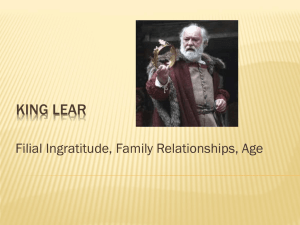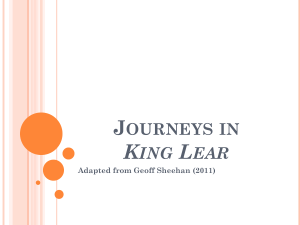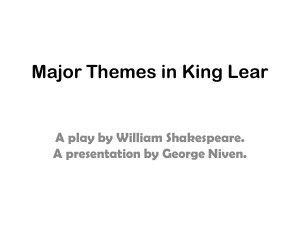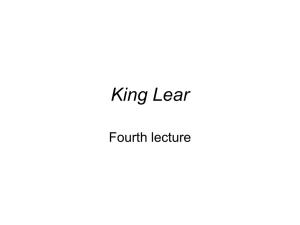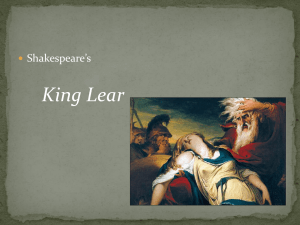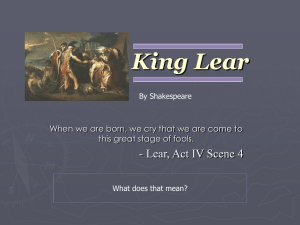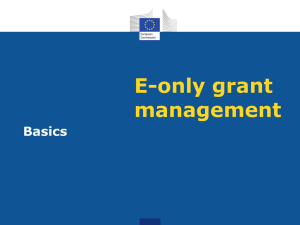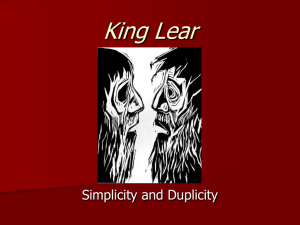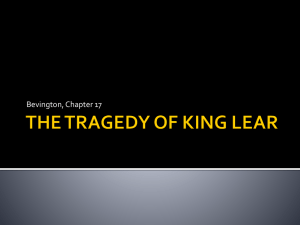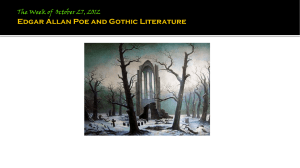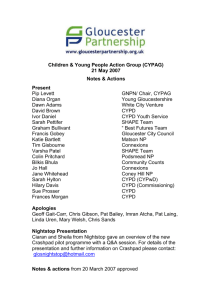King Lear
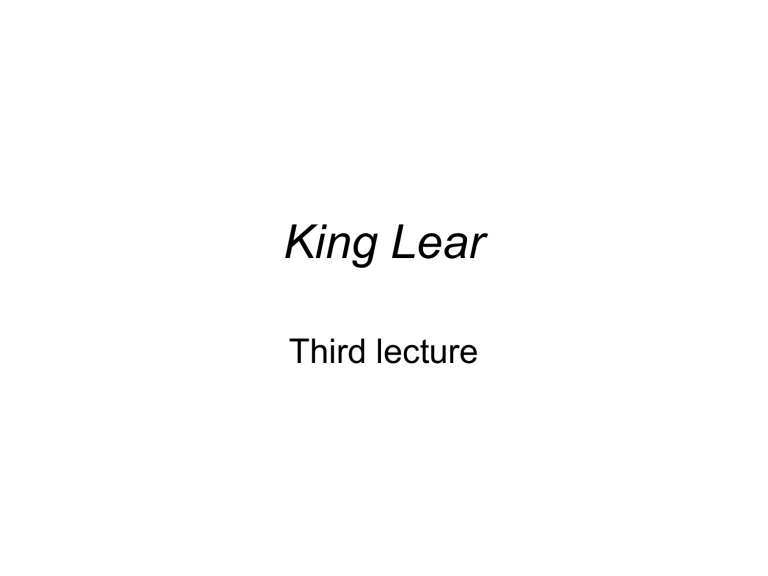
King Lear
Third lecture
The Gloucester subplot
• The division between the generations clearly parallel to the Lear plot.
• Like Cordelia, Edgar, the good son, is driven out.
• Like Lear with his daughters, Gloucester is blind to
Edmund’s treachery.
• And Gloucester’s blindness parallel’s Lear’s madness.
• The scene literalizes Gloucester’s metaphor of the violence done to Lear (III.7.4849): “Because I would not see thy cruel nails pluck out his poor old eyes.”
• The blinding of Gloucester a scene of unmitigated, nightmarish horror: “out vile jelly!”
• Gloucester is “enlightened” at the precise moment he is blinded: “Then Edgar was abused.”
• Just as Lear’s madness comes of his understanding of
Goneril and Regan’s cruelty to him.
Gloucester and Edgar
• Edgar’s optimism at IV.1 – “Yet better thus . . .” is shattered when his father comes in.
• And he himself alludes to the temptation of suicide? Ll.
10-11.
• Gloucester’s “I stumbled when I saw.”
• And his yearning “to see [Edgar] in my touch.” And his near recognition of Edgar in “Poor Tom.”
• His inability to “see” Edgar?
• His despair: “As flies to wanton boys are we to th’ gods;/
They kill us for their sport.”
• Why does Edgar not reveal himself to Gloucester at this point?
• But instead lead him to Dover and the feigned miracle.
• “’Tis the time’s plague when madmen lead the blind.”
Edgar’s “miracle”
• It seems to come in place of Edgar’s “recognition” of
Gloucester.
• And it plays with the audience’s perceptions: what characters say on stage are the sets and settings on
Shakespeare’s stage.
• So what Edgar and Gloucester say at the beginning of
IV.6 must confuse us: are we laboring up the hill to Dover cliff or not?
• And has Edgar thrown off his “Poor Tom” act?
• How staged?
• Edgar’s own doubts: might his “miracle” have killed his father through the imagination of suicide?
• His explanation literalizes Gloucester’s despair in terms that come of a morality play: “the fiend.”
• Edgar’s lesson: “Bear free and patient thoughts.”
• But why didn’t Edgar simply declare himself to
Gloucester?
Lear’s journey
• Just as Lear’s “prayer” recognizes the “Poor naked wretches” (III.4), such a naked wretch enters in Edgar’s guise of “Poor Tom.”
• Almost as if Lear’s altered state of mind causes what he imagines to materialize!
• Lear’s growing madness mirrored in the feigned madness of Poor
Tom.
• Edgar plays the role of repentant Mankind, such as one might see in a morality play.
• Which includes temptations to suicide, as well as to others of the
“seven deadly sins” (III.4.85-100).
• Lear embraces him as “unaccommodated man,” “the thing itself” – humanity in its most basic state.
• . . . and attempts to imitate, identify with Poor Tom: “Off, off, you lendings!”
• And another “pat” entrance: the fool speaks of “a little fire in a cold field were like an old lecher’s heart – a small spark, all the rest on’s body cold.”
• And who should come it but the the old lecher himself, Gloucester!
• Whom Edgar calls “the foul fiend Flibbertigibbit.”
• A nightmare world: see Gloucester’s lines: “Our flesh and blood, my lord, is grown so vile/ That it doth hate what gets [i.e., begets] it.”
• “Tom” becomes Lear’s “philosopher.”
Fourth stage of Lear’s journey: Lear completely mad encountering the blind Gloucester
• IV.6: Lear on the heath, “mad, bedecked with weeds” . . .
• . . . stripped of all his identity – he too is now “unaccommodated man”? –
• . . . encounters the blinded Gloucester.
• Lear’s “pardoning” of Gloucester’s adultery – and his mad misogyny.
• Gloucester: “O let me kiss that hand.”
• Lear: “Let me wipe it first. It smells of mortality.”
• He “mistakes” Gloucester’s bandage for Cupid’s blindfold – somehow connecting his sin with its punishment.
• Seeing the world “feelingly”: the world’s hypocrisy.
• Lear’s mad insights into authority: “a dog’s obeyed in office.”
• And the hypocrisy of justice: tattered clothes vs. furred gowns.
• How much of Lear’s discourse is madness, how much a new clarity?
Edgar exclaims, “O matter and impertinency mixed! Reason in madness.”
• His “lesson” to Gloucester: “Thou must be patient.”
• And the newborn infant’s tragic understanding of life.
The meeting with Cordelia
• There was a climactic scene in the old morality plays when the penitent protagonist was given a “garment of repentance” by the saving Virtue character.
• IV.7: Lear brought in, freshly clothed, asleep in chair.
• Cordelia slowly wakens him with music, kisses him.
• Lear’s “true” delusion: “Thou art a soul in bliss . . .”
• And in kneeling plays the part in old the morality play.
• And slowly recovers a sense of himself.
• But only in a relational sense to Cordelia? “ as I am a man , I think this lady/ To be my child Cordelia.”
• His guilt? “No cause. No cause.”
• And then in V.3 he imagines a contented life in prison with Cordelia.
• But the ordeal is not yet finished.
Back to Lear and Gloucester plots
• Edgar’s “miracle” scene analogous to Cordelia’s meeting with her father.
• But things remain more abstract?
• Despair to be cured abstractly, by the staged “miracle”?
• Reiterated at V.2: 9-11: “Ripeness is all.”
• But still he doesn’t reveal himself.
• After the battle, Edgar and Edmund “exchange charity.”
• And Edgar holds to a sense of absolute justice: “The dark and vicious place where thee he got/ Cost him his eyes.”
• But seems to admit his own fault in concealing himself from his father: ll 193ff.
• The circumstances suggest a dark and rigid justice playing itself out: Edmund and Gloucester both die.
• And Edgar, the just son, survives.
• But how does this compare to the Lear story?
